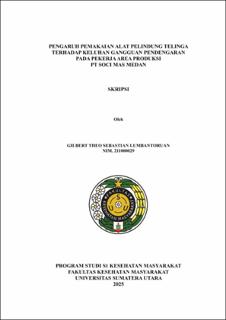Pengaruh Pemakaian Alat Pelindung Telinga terhadap Keluhan Gangguan Pendengaran pada Pekerja Area Produksi PT SOCI MAS Medan
The Effect of Using Ear Protection Devices on Complaints of Hearing Loss in Production Area Workers of PT. SOCI MAS Medan

Date
2025Author
Lumbantoruan, Gilbert Theo Sebastian
Advisor(s)
Silaban, Gerry
Metadata
Show full item recordAbstract
Occupational safety and health are essential processes to protect the physical and mental well-being of workers and play a critical role in reducing the risk of workplace accidents and occupational illnesses. Workplace exposures can lead to occupational diseases (ODs) related to specific industries, one of which is noise-induced hearing loss (NIHL). Prolonged exposure to loud noise in the workplace can impair workers' communication abilities, decrease productivity, and lead to social isolation. This condition directly impacts physiological, psychological, communicative, balance, and auditory health (including deafness). This study aims to analyze the effect of use of ear protection on hearing impairment complaints and the moderating roles of age and length of service among production area workers at PT SOCI MAS Medan. The research employs a quantitative analytical method with a cross-sectional approach. The sample consists of 47 workers selected using purposive sampling. Data on hearing complaints were collected using the Mackay Hearing Questionnaire, age and length of service data through a questionnaire, and data on ear protection usage through an observation sheet. Moderated regression analysis was employed to process the data. The findings indicate that 51.1% of workers use ear protection, 53.3% of workers are in the high-risk age group (> 40 years), 59.6% have a high-risk length of service (> 10 years), and 63.8% report hearing impairment complaints. The results also reveal a direct effect of ear protection usage on hearing complaints (p = 0.033), no significant moderating effect of age (p = 0.244), and a significant moderating effect of length of service (p = 0.027). These findings underscore the need for PT SOCI MAS Medan to implement a hearing conservation program, conduct training and education to improve compliance with ear protection usage, and regularly monitor noise levels in production areas.
Collections
- Undergraduate Theses [3355]
